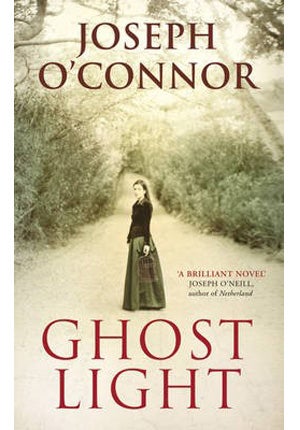Ghost Light, By Joseph O'Connor
The purists will be up in arms, but no mind: this retelling of a theatrical tryst is engrossing stuff

"Certain biographers will want to beat me with a turf shovel," Joseph O'Connor admits with commendable openness while acknowledging the licence his latest novel takes with the documented lives of his two famous principals: John Millington Synge, perhaps Ireland's most eminent playwright of the 20th century; and his fiancée, the actress Molly Allgood. Synge co-founded Dublin's Abbey Theatre with WB Yeats and Lady Gregory, and his protestant, Anglo-Irish heritage fuelled the furore that surrounded his influential plays (riots marked the 1907 première of Playboy of the Western World two years before his early death). Yeats and his circle, Synge's mother and Molly's family all strongly disapproved of their compromising liaison, which O'Connor conjures here with lyric intensity.
So why risk the turf shovel? Within a specific political and historic context, O'Connor has fashioned the delicate bloom of a love story, from its pollination in the Dublin theatre to its wistful autumn in the steady decline of Allgood's stage career. Unlike the biographer, more or less tethered to the obduracy of facts, O'Connor has been able to pick and choose the emphasis and style of his presentation, fleshing out his own drama on the skeleton of what is known or imagined of Synge's affair with Molly. Their month's dalliance in a Wicklow cottage, for example, while John recuperates from unsuccessful chest surgery, is a detour from fact that dramatically reveals the emotional heart of this tender novel in its clandestine arrangement and precarious outcome.
In 1952, Molly is stumbling across London from her Maida Vale tenement to the BBC studios, where she is to record a radio play. En route, she reviews the substance of her life – the peak of her stardom as an Irish actress touring America, tacit resentment of her sister's more successful career, her indulgence of Synge and audacity with Yeats – all of which drifts through the alcoholic haze of her present, humiliating penury in a bleak and pinched post-war London. Molly's erratic recall provides the subtle rhythm of this meditative excursion but, as a narrative strategy, this does carry some risk.
The Wicklow sojourn is a case in point. Beautifully written and charming in its evocation of the flirtatious caper of their minor elopement (while underlining the inherent limitations and social dangers of their situation), it is an episode within Molly's meandering path that has more vivacity than the continuity links threading these retrospective glances together. With a narrative structure relying on a sequence of such sharp vignettes, there's a danger of incoherence, but O'Connor, in his seventh novel, has the skill and maturity to sustain Molly's lament through its more lachrymose moments.
After a garish debut, a punchy follow-up and a couple of rather uneven, variously comic novels, O'Connor hit his stride with Star of the Sea, his bestselling 2003 saga of Irish emigration to America that mapped an engrossing historical context on to a relentless narrative drive. Redemption Falls followed, extrapolating the fate of one character from the previous novel in grittier, pared-down prose that occasionally resonated with the menace of Cormac McCarthy's emotionally atrophied landscapes. Ghost Light deploys the same tenacious grip of period but sacrifices the narrative pace that made his American sagas so compelling. The result is more akin to The Hours, Michael Cunningham's sedate but perfumed homage to Virginia Woolf. With her defiant triumphs, disappointments and fug of alcoholic solace, Molly's character is engaging and affecting, and sufficient to carry off this slightly diffuse final soliloquy.
Subscribe to Independent Premium to bookmark this article
Want to bookmark your favourite articles and stories to read or reference later? Start your Independent Premium subscription today.

Join our commenting forum
Join thought-provoking conversations, follow other Independent readers and see their replies